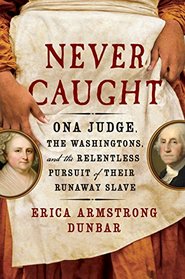My favorite historical character of all time is Abraham Lincoln. In 1854, Lincoln wrote a friend stating, "If slavery isn't wrong, then nothing is wrong." I couldn't agree more. It bothers me greatly we still have human slavery, illegal as it is, even in the U.S.
As such, I found this to be a fascinating book. George Washington was a man to be much admired. But like any man or woman he had his faults. And we need to recognize this in an era where too many other men and women think they are all important.
Having said all that, I think the author goes a bit overboard in her depiction of life, slave life included, in 18th century America. Yes, life was hard then, and, generally, it was harder for slaves; but everyone, if you weren't rich, had a hard life.
The author describes the hard toil of everyday life for domestic slaves. Yet, if you weren't rich, life was hard for those who were white too. White women who lived on farms and in towns in the North and South worked just as hard as domestic female slaves. If you are widely-read in early American history you know that for a fact. Yet the author time and again stresses how much harder it was for black domestic workers in the North. I know she has a message to get out, but this somewhat cheapens her message.
Plus, when describing black sailors---as Ona Judge married one---she also states "...seafaring was viewed as an unstable and unseemly occupation for whites." I am surprised she says this, as seafaring was a highly respectable occupation in New England for scores, if not hundreds, of years. Many a man started out as a "landsman" on his first day on a ship, only to rise to the rank of First Mate, Master or even Captain later in life.
In fact, for many black men serving as sailors in the merchant fleet, or U.S. Navy---especially during the Civil War---discrimination was something not often encountered. They slept in the same crew quarters and ate at the same tables as their white crew mates.
As such, I found this to be a fascinating book. George Washington was a man to be much admired. But like any man or woman he had his faults. And we need to recognize this in an era where too many other men and women think they are all important.
Having said all that, I think the author goes a bit overboard in her depiction of life, slave life included, in 18th century America. Yes, life was hard then, and, generally, it was harder for slaves; but everyone, if you weren't rich, had a hard life.
The author describes the hard toil of everyday life for domestic slaves. Yet, if you weren't rich, life was hard for those who were white too. White women who lived on farms and in towns in the North and South worked just as hard as domestic female slaves. If you are widely-read in early American history you know that for a fact. Yet the author time and again stresses how much harder it was for black domestic workers in the North. I know she has a message to get out, but this somewhat cheapens her message.
Plus, when describing black sailors---as Ona Judge married one---she also states "...seafaring was viewed as an unstable and unseemly occupation for whites." I am surprised she says this, as seafaring was a highly respectable occupation in New England for scores, if not hundreds, of years. Many a man started out as a "landsman" on his first day on a ship, only to rise to the rank of First Mate, Master or even Captain later in life.
In fact, for many black men serving as sailors in the merchant fleet, or U.S. Navy---especially during the Civil War---discrimination was something not often encountered. They slept in the same crew quarters and ate at the same tables as their white crew mates.




